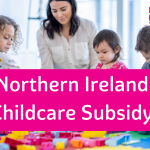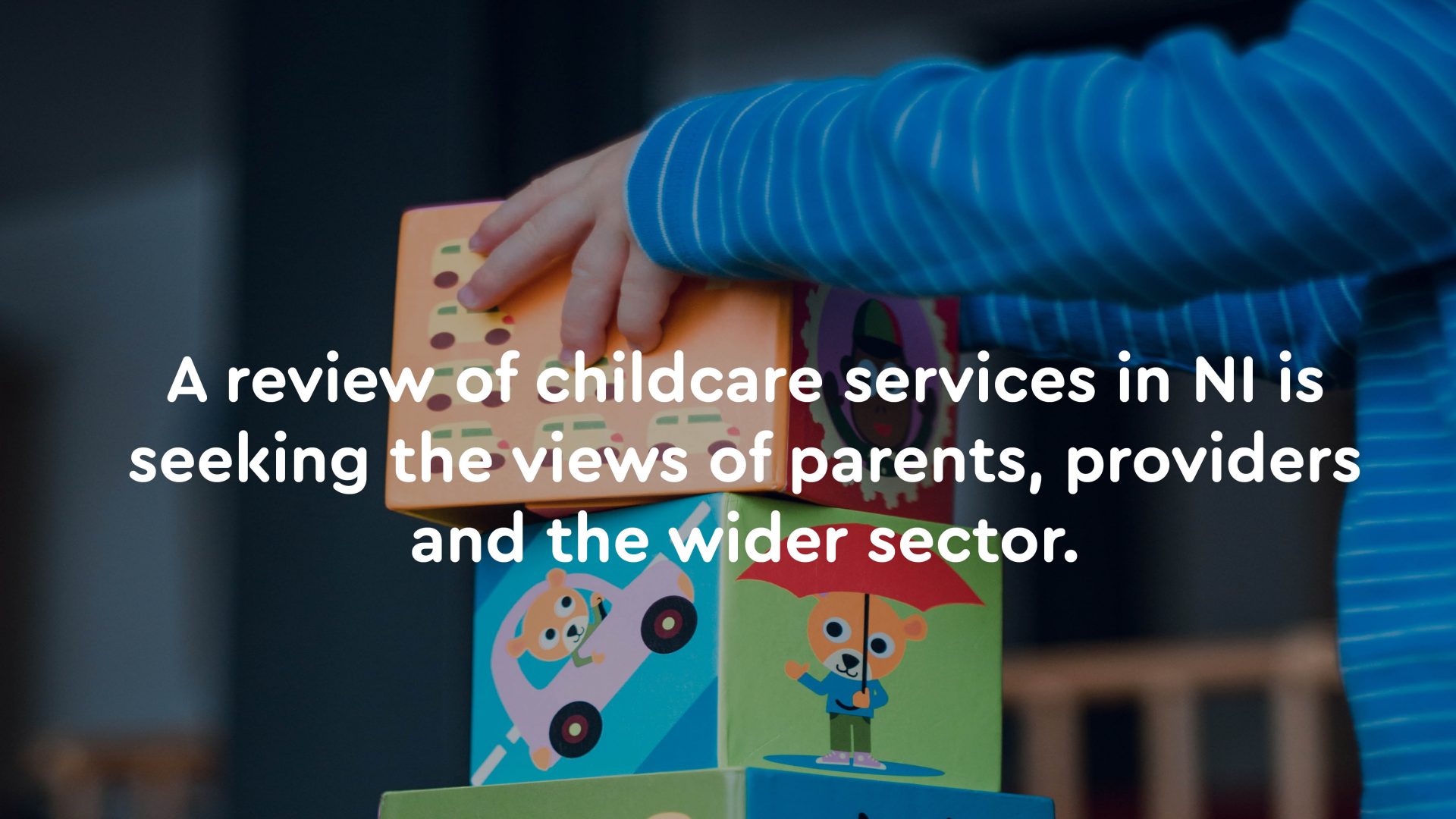All Party Group highlights importance of progress on new Childcare Strategy for Northern Ireland
The All Party Group on Early Education and Childcare, chaired by Nicola Brogan MLA, met in the Long Gallery, Parliament Buildings on Wednesday 7 September 2022. This was the first ‘in-person’ meeting of this important All Party Group, which was officially established during the Covid-19 pandemic. The meeting brought together elected representatives, senior departmental officials and a wide range of stakeholders representing early education and childcare, the women’s sector, business, parents’ organisations and the broader third sector.
As the first meeting in the new Assembly mandate, it was an opportunity to hear important presentations from senior officials:
- Tina Dempster, Head of the Childcare Strategy Team within the Department of Education shared details of an earlier announcement by Education Minister Michelle McIlveen in relation to proposals to standardise pre-school education and an update on progress towards the Executive Childcare Strategy.
- Marc Bailie, Head of the Family Policy Unit at the Department of Health delivered an update on childcare registration policy.
- Gemma Blake, Department for the Economy, shared a new guide that has been developed to help employers ensure their staff are accessing financial support with registered childcare costs.
Update on Childcare Strategy developments and proposal for 22.5 hours of funded pre-school education for every child
Tina Dempster provided a detailed update on ongoing work to develop a new Executive Childcare Strategy for Northern Ireland, echoing a Statement issued by Education Minister Michelle McIlveen earlier in the day.
Reflecting engagement with stakeholders, and in recognition of the importance of childcare and early education in a child’s development, planning is now underway to develop an integrated Early Learning and Childcare Strategy.
A core component of this is a new proposal to offer every child in their pre-school year a minimum of 22.5 hours of pre-school education per week.
At present, 60% of children in their immediate pre-school year can access a minimum of 12.5 hours of pre-school education per week, during term time. 40% of children are accessing 22.5 hours of pre-school education per week.
Through the new proposal, every child aged 3-4 should be able to access a minimum of 22.5 hours of funded pre-school education per week. Tina noted that implementing this proposal would take time and careful planning, but funding has been allocated by the Minister for the development of a costed delivery plan and timetable, with work commencing in the autumn.
Initially, this will involve a pilot programme to create new full-time statutory nursery provision in certain areas. This will inform plans for the standardisation of all pre-school education sessions, including a phased lifting of the current restriction on the creation of new full-time provision. At the same time, officials will look at how to support existing part-time pre-school provision to convert to full-time provision, potentially from September 2023 onwards.
Tina also provided an update on developments which are helping to inform the wider Strategy:
- Invitations to participate in a new Stakeholder Engagement Forum will issue this week, with the first meeting expected to take place in October 2022.
- An independent Review of Childcare Services in Northern Ireland is currently underway and due to report by the end of December 2022.
- A review of DE targeted early years interventions, including consideration of how Sure Start services are currently targeted, will report by the end of November 2022.
- A report of the Department of Finance Strategic Insight Lab which took place at the end of 2021 will be published before the end of this week.
The Department of Education continues to work on developing the Strategy, and costed options should be ready for consideration by the Executive by March 2023. A consultation on the draft Strategy will follow, subject to Executive approval and funding.
Tina advised that, in the meantime, the Minister has also taken steps to:
- Address the affordability of childcare for families by writing to the UK Chancellor to request an uplift in the rate of the Tax-Free Childcare scheme from 20% to 30% to support eligible families with their childcare costs.
- Relieve some of the current pressures experienced by childcare providers by writing, jointly with the Health Minister, to ask the Justice Minister for an update on proposals to streamline the AccessNI process for those working in the childcare sector.
Discussion
Following Tina’s presentation, there was a wide-ranging question and discussion session with those in attendance. Many welcomed the proposals and the work that is on-going, while expressing that more is needed to deliver the new Strategy as a matter of urgency, and to address the immediate cost of living challenges that are putting real pressure on families and on the childcare sector.
Some clarification was sought on what sectors would be included in the pilot programmes establishing new full-time pre-school provision, whether any consideration had been given to the role of registered childminders, and how the standardisation could be accommodated. Tina advised that this would all be considered as part of the extensive scoping study being undertaken. She noted that while registered childminders would not be part of the delivery infrastructure for the standardised pre-school places, they will be as part of the wider Executive Childcare Strategy.
When asked about whether there are plans to provide immediate financial support to the sector, given the worsening cost of living crisis, Tina confirmed that the Minister is very aware of the pressures facing families and childcare providers, and recognises the importance of childcare being available. Work is ongoing across all Departments to consider what can be done to support people and businesses, including childcare. This will be in the context of the wider, UK wide measures developed by the Government at Westminster. Several attendees expressed concern at the impact of rising costs on the sector and its ability to ‘survive’ the difficult winter that is looming, without financial support.
There was agreement that pre-school education is not the same as childcare, and that the standardisation of pre-school places – while welcome as an initial first step – does not address the childcare needs of families with children of all ages. Tina noted that this is all part of the wider Executive Childcare Strategy, which is examining schemes offered elsewhere to learn from them. Tina also confirmed that the childcare needs of families who have a child with a disability will be a specific issue examined and addressed in the development of the new Childcare Strategy.
Concern was expressed about the increasing number of registered childminders who are leaving the sector, with an expectation that this number may rise due to the rising cost of living, particularly as we move into the winter months. The Department of Education is aware of the reduction in registered childminders, with Tina noting that there has been a reduction over a number of years, a picture similar to that in other jurisdictions. This will be examined carefully as part of the ongoing engagement and scoping work being taken forward.
Several attendees referred to workforce challenges facing group settings, with enormous difficulties facing the whole sector in relation to staff recruitment and retention. Tina noted that this was a strong message to emerge from the Strategic Insight Lab, and that this will be a specific area of review.
On the issue of easements in relation to AccessNI requirements, aiming to streamline staff recruitment, the point was made that a greater barrier to onboarding new staff can be delays in securing the appropriate medical checks and GP certification. This is an issue not just for settings, but also within Further Education in relation to moving students into placements or into work. Marc Bailie, from the Department of Health, noted that the Department is willing to consider any easements that may relieve pressure within the system, and welcomed engagement to discuss these further.
Update on childcare registration policy
Marc Bailie gave an overview of the role of the Department of Health in the regulation and inspection of the childcare sector. He noted work undertaken during the Covid-19 pandemic to introduce several easements to assist the sector, and reflected on the experience of doing so, with none having raised any concerns in relation to safeguarding.
Marc also introduced the forthcoming review of Childcare regulation policy. This will begin with pre-consultation engagement over the coming weeks, during which he is happy to meet with anyone and invited attendees to get in touch with queries or suggestions. It is envisaged that the consultation will open before the end of March 2023.
Below are links to the Minimum Standards and Implementation Guidance which will be considered during the review:
Discussion
During the discussion which followed, attendees welcomed the opportunity to get involved in the consultation and the pre-consultation engagement.
There was recognition that the review of Childcare regulation policy would need to be considered strategically alongside the development of the new Childcare Strategy and any plans to standardise existing pre-school provision.
It was noted that across the sector there is concern about the number of unregulated and unregistered ‘childcare providers’, particularly ‘childminders’, who are currently operating. While for some parents, the choice to use an unregistered provider may be due to perceptions of affordability, for others it is due to lack of choice when there is limited availability of registered childcare in their area.
Tina noted that understanding these issues is also an important part of the independent Review of Childcare Services currently underway. Parents and childcare providers are being surveyed on a wide range of issues. Links to the surveys will be shared with the group, who were asked to circulate details across their networks to secure a strong response rate.
Tina also highlighted work that is ongoing to promote the various existing forms of financial support for families and to reinforce the benefits of registered childcare to parents. It was noted that this needs to be further factored in to the development of the longer term Childcare Strategy, as financial investment that enables childcare providers to sustainably deliver high quality care, at a reduced cost to parents, ensuring registered childcare is affordable and accessible for all, would be key to addressing the issue of unregistered provision.
Adding to the earlier discussion about easements in relation to AccessNI checks and GP certifications, there was a suggestion to look at streamlining Health and Social Care Trust checks for staff.
Employers guide to childcare
Gemma Blake shared a new guide that has been developed to help employers ensure their staff are accessing financial support with registered childcare costs. The guide was informed by engagement with a wide range of stakeholders, including many of those attending the All Party Group meeting. It was developed by the Department for the Economy alongside the Labour Relations Agency, and in conjunction with the Departments for Communities, Education, Health and Employers For Childcare. Gemma noted that childcare had emerged as a key issue through work on the Covid-19 Economy Recovery Plan. Both Gemma and Mark McAllister, Director of Employment Relations Services, with the Labour Relations Agency, reflected on the importance of childcare to employers and to the economy as a whole.
The guide was welcomed by attendees, and is available to download as part of the LRA’s Employment Document Toolkit: https://www.lra.org.uk/employment-document-toolkit
Looking ahead
Chair Nicola Brogan closed the meeting with a discussion of the aims and objectives of the All Party Group, which had previously been agreed with the members at the Annual General Meeting. Reflecting the important discussion at the All Party Group, she advised that the next meeting will be focused on the impact of the cost of living crisis on the childcare sector, and measures that can be taken to address this. Finally, it was agreed that – going forward – meetings of the Group will be held alternately via zoom and in person, in Parliament Buildings.
Thanks to speakers, members and stakeholders for their engagement
Commenting on today’s meeting, Chair Nicola Brogan MLA thanked the speakers, the members, and all those who attended:
“It was fantastic to join today with so many passionate and dedicated individuals who are working to make a difference in the lives of children and families, and particularly to meet in person when so much of our engagement over the last couple of years has been online.
I would like to thank the Departmental officials who took the time to provide their detailed and considered updates to the Group, and look forward to hearing more as their work progresses at pace over the coming weeks and months. It is a hallmark of importance of this All Party Group that it benefits from the wide-ranging participation of elected representatives, Departmental officials and informed stakeholders.
Today’s meeting once again brought powerful testimony of the need to invest in this essential sector and the benefits of doing so. What emerged was a clear message that not only do we need to see urgent progress on a bold and ambitious Childcare Strategy, but also immediate financial assistance to support the sector through the current cost of living crisis.
I am eager to working constructively with members of the Group to maintain a clear focus on this critical issue.”
Find out more about the All Party Group on Early Education and Childcare
Further information on the All Party Group on Early Education and Childcare, including links to read more about previous meetings, is available here.
Employers For Childcare provides the Secretariat for the All Party Group on Early Education and Childcare – correspondence to aoife.hamilton@employersforchildcare.org or 028 9267 8200.






